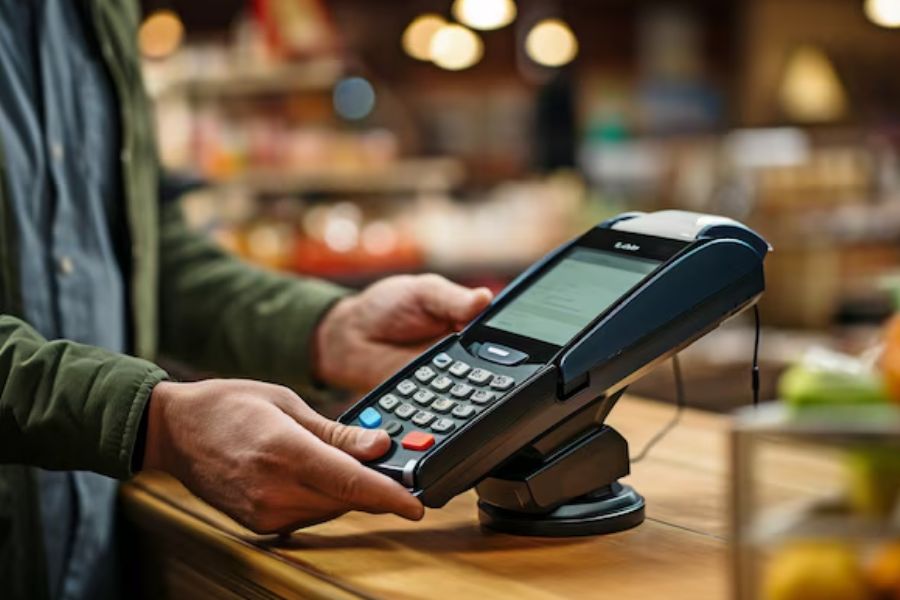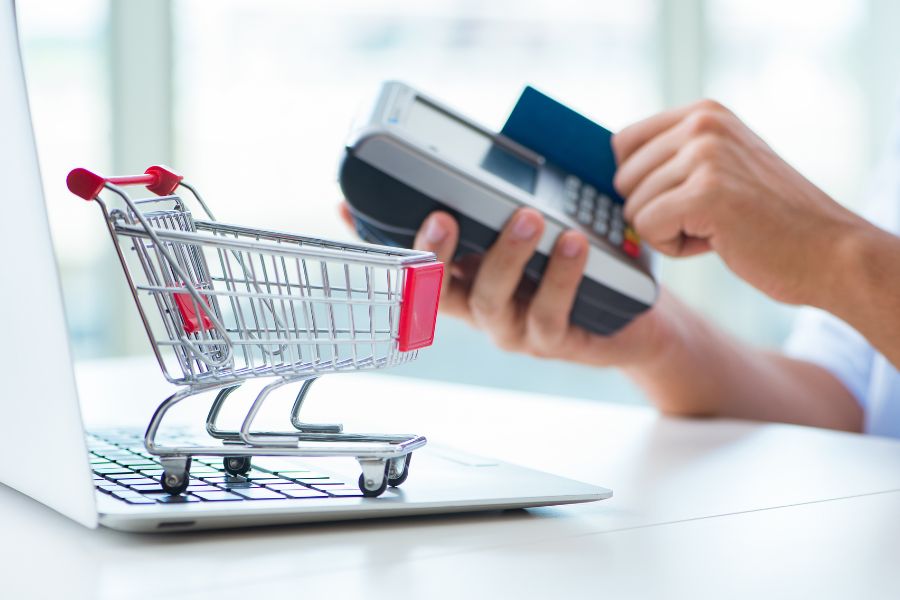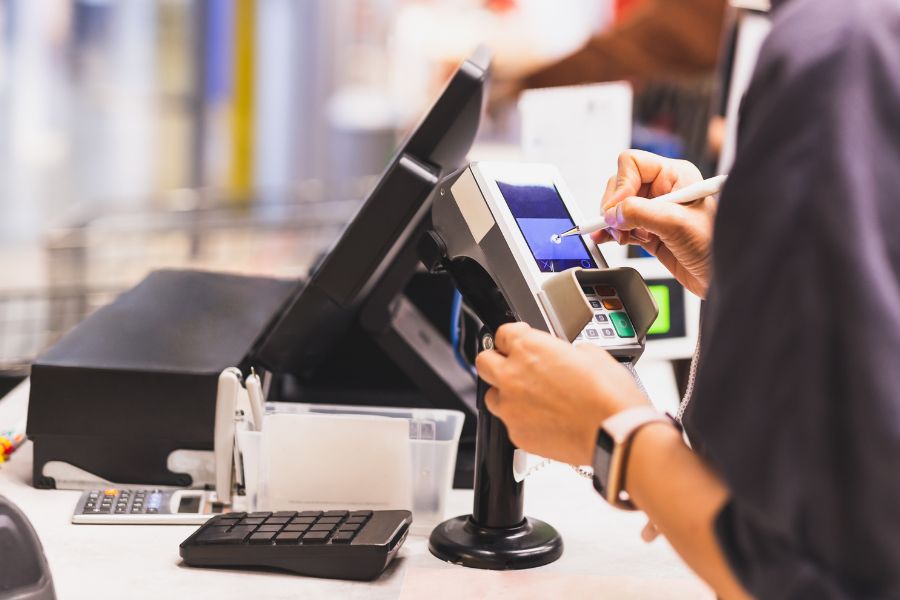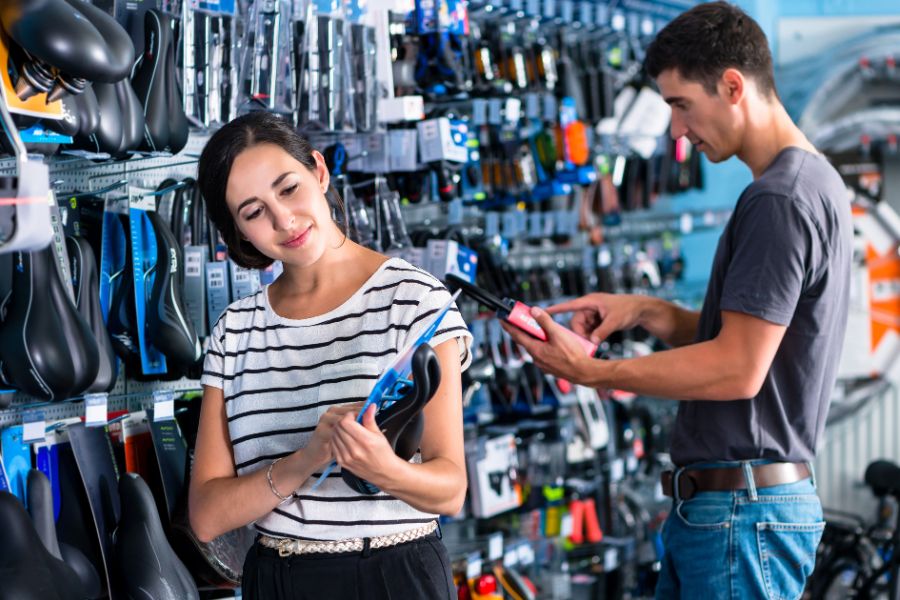What is a mobile POS? This term refers to a system that turns mobile devices like smartphones and tablets into fully functional point-of-sale terminals. Mobile POS systems allow businesses to conduct transactions and manage operations anywhere, offering significant flexibility. In this article, we’ll explore how they work, their types, and their pros and cons, providing a clear understanding of their impact on modern commerce.
What Is A Mobile POS?
mPOS, or mobile point-of-sale, is a technology that enables smartphones, tablets, or dedicated wireless devices to function as cash registers or electronic POS terminals wirelessly.
Compared to traditional POS systems, mPOS solutions require minimal setup. Traditional POS setups typically involve a mini desktop computer connected to a barcode scanner, touchscreen monitor, cash drawer, and receipt printer.
In contrast, an mPOS setup can be as simple as a smartphone equipped with a credit card reader and 5G service. This simplicity significantly reduces setup costs and allows mPOS systems to be used virtually anywhere.
How a Mobile POS Works
Understanding a mobile POS is important, but to fully grasp its potential, it’s crucial to comprehend how it works.
Nearly any smartphone or tablet can be transformed into an mPOS terminal. To set up, a business simply signs up with an mPOS provider and downloads an app onto their device. Typically, a hardware card reader is connected via the device’s USB-C or lightning port to handle near-field communication (NFC) or chip payments. Some of these readers also offer barcode scanning and receipt printing capabilities.
While older card readers that connect through the audio jack are mostly obsolete, Bluetooth receipt printers are still an option. Modern mPOS apps can use the smartphone’s built-in NFC reader without needing additional hardware, a method known as tap-on-phone or software POS.
Usually, the mPOS provider doubles as the credit card payment processor. Importantly, no customer or payment data is stored on the device itself, ensuring security. Payments are directly deposited into the business’s bank account.
Some mPOS systems can integrate with traditional POS systems, while others offer comprehensive business management solutions, including sales tracking, inventory management, customer loyalty programs, returns processing, gift cards, and individual employee accounts.
Types of mobile POS
The global number of users in the ‘Mobile POS Payments’ segment of the fintech market is projected to steadily rise from 2024 to 2028, with a total increase of 330.5 million users (an increase of 19.65%). This growth reflects the increasing adoption and utilization of various types of mobile POS systems worldwide.
- Smartphone and Tablet-Based mPOS
This type utilizes a smartphone or tablet as the main device. It requires additional hardware like card readers, which connect via USB-C, lightning port, or Bluetooth. Examples include Square, PayPal Here, and SumUp. Due to their portability and low cost, these systems are ideal for small businesses, pop-up shops, and mobile service providers.
- Dedicated mPOS Devices
These are purpose-built devices designed specifically for mPOS functionalities. They come with integrated card readers, barcode scanners, and receipt printers. Examples include Clover Flex and Poynt Smart Terminal. These devices suit medium to large businesses requiring robust and reliable POS solutions, such as retail stores and restaurants.
- All-in-One mPOS Systems
These systems combine all necessary components into one device, including built-in card readers, printers, and sometimes barcode scanners. Examples are Verifone e285 and Ingenico Moby/5500. They are best for businesses looking for a compact and comprehensive solution without the need for multiple devices.
- App-Based mPOS
These systems run on standard smartphones or tablets using a specific app provided by the mPOS vendor. They may require additional hardware for card reading but often utilize the device’s built-in features like the NFC reader. Examples include Square, Shopify POS, and Zettle by PayPal. This type is great for businesses needing a flexible, software-focused solution that can quickly adapt to various payment methods.
- Hybrid mPOS Systems
These systems combine features of traditional POS and mPOS, allowing integration with existing POS infrastructure. They include both mobile and fixed terminals, often connected via cloud-based software. Hybrid mPOS systems are ideal for businesses looking to expand their POS capabilities without completely overhauling their existing systems, such as restaurants and retail chains.
- Contactless mPOS
This type focuses on contactless payments, using NFC technology for transactions. Often, it does not require additional card readers, leveraging the device’s NFC capabilities. Examples include Apple Tap to Pay and Google Pay for Business. Contactless mPOS systems are perfect for businesses prioritizing hygiene and convenience, such as cafes and small retail outlets.
Each type of mPOS offers unique advantages tailored to different business needs, ensuring flexibility and efficiency in various operational contexts.
Benefits of Mobile POS
Enhanced Customer Experience
mPOS systems direct the sales process to the customer, improving their experience and reducing wait times. This mobility also reduces the need for dedicated countertop POS space.
Versatile Payment Options
In 2023, digital or mobile wallets became the most utilized payment method in physical shops globally, a trend expected to surge further by 2027. mPOS systems accommodate diverse payment methods, from tap-to-pay and chip cards to mobile wallets like Google Wallet and Apple Pay, along with QR code payments.
Mobility and Minimal Infrastructure
The inherent mobility and low infrastructure requirements make mPOS ideal for businesses without fixed locations, such as food trucks, home repair services, farmers markets, stadium vendors, and cleaning services.
Specialized Solutions for Food and Beverage Services
Some mPOS vendors cater specifically to the food and beverage industry, allowing orders to be sent directly from servers to the kitchen, reducing wait times. Table-side ordering systems enable guests to enter their own orders, and many restaurants successfully use mPOS at tables to finalize transactions.
Cost-Effective
mPOS systems can be more affordable than traditional POS terminals, enabling businesses to start with minimal capital investment. Even small cash-only vendors, such as street vendors, can quickly and inexpensively start accepting credit card payments. Additionally, many mPOS providers offer fixed POS tablet-style terminals.
Increased Checkout Capacity
During peak times, businesses using traditional POS systems can enhance their checkout capacity by equipping sales staff with mPOS terminals. This allows transactions to be completed on the sales floor, maintaining customer interest.
Enhanced Security and Compliance
Since mPOS systems handle the entire transaction process, they reduce business liability by not storing credit or debit card data on the terminal. This minimizes the need for businesses to adhere to security regulations like PCI DSS compliance. Some systems also support customer loyalty programs, further enhancing their value.
ConnectPOS includes a powerful mobile POS solution, designed to cater specifically to the dynamic needs of modern retailers. Our mobile POS system offers a seamless and efficient way to manage in-store transactions and streamline operations.
With features such as real-time synchronization with online sales channels, inventory management, and comprehensive analytics, ConnectPOS enables businesses to enhance customer interactions and increase sales productivity. This solution not only simplifies the checkout process but also provides valuable insights that help retailers make informed business decisions.
Drawbacks of mobile POS
Reliance on Internet Connectivity
Mobile POS systems heavily depend on stable internet connectivity. In areas with poor signal or during network outages, transactions may be delayed or unable to process, leading to frustrated customers and lost sales.
Security Concerns
While mPOS systems offer convenience, they also pose security risks. Mobile devices are susceptible to theft, loss, or hacking, potentially compromising sensitive customer data if not adequately protected.
Limited Battery Life
Mobile devices have finite battery life, which can be a significant limitation for businesses with high transaction volumes or long operating hours. Requiring frequent recharging interrupts service and reduces efficiency.
Hardware Compatibility Issues
Compatibility issues may arise when integrating various hardware components with different mobile devices. For example, some card readers or printers may not work seamlessly with certain smartphones or tablets, leading to operational disruptions.
Reduced Transaction Speed
Compared to traditional POS systems, mobile POS transactions sometimes take longer to process due to factors such as slower hardware, network latency, or manual entry errors. This can result in longer wait times for customers, impacting satisfaction levels.
While mobile POS systems offer flexibility and convenience, businesses must carefully consider these drawbacks and assess whether they align with their operational needs and priorities before adopting them.
FAQs: What Is A Mobile POS System
- What hardware is typically needed for a Mobile POS System?
Mobile POS systems typically require a smartphone or tablet as the primary device. Hardware components may include card readers, barcode scanners, receipt printers, and cash drawers. Some systems may also utilize peripherals like stands or cases for the mobile device.
- Are Mobile POS Systems suitable for large businesses?
Yes, mobile POS systems can suit large businesses, depending on their specific needs and requirements. While they may not offer the same level of robustness and scalability as traditional POS systems, many mobile solutions can cater to the needs of larger enterprises, especially when combined with cloud-based management and integration capabilities.
- Can Mobile POS Systems work offline?
Some mobile POS systems offer offline functionality, allowing businesses to continue processing transactions even when internet connectivity is unavailable. However, offline capabilities may be limited compared to online mode, and certain features like real-time inventory updates or payment processing may be temporarily unavailable.
- What are the costs associated with Mobile POS Systems?
The costs associated with mobile POS systems can vary depending on factors such as the vendor, hardware requirements, software features, and service plans. Common expenses include upfront hardware costs (e.g., mobile devices, card readers), software licensing or subscription fees, transaction processing fees, and additional services such as customer support or software updates.
- How do Mobile POS Systems handle returns and refunds?
Mobile POS systems typically offer functionality for processing returns and refunds directly from the device. Employees can initiate return transactions, select the items being returned, and choose the appropriate refund method (e.g., original payment method or store credit).
Depending on the system, refunds may be processed immediately or require approval from a manager or supervisor. Transaction records are updated accordingly to reflect the return/refund activity.
Conclusion
The rise of Mobile Point-of-Sale (mPOS) systems revolutionizes retail and service industries, offering unmatched flexibility and efficiency. mPOS empowers businesses to streamline operations, improve customer experiences, and adapt to a digital-centric world. We trust this article clarifies your question “what is a mobile POS?”
As technology continues to advance, the integration of mobile POS systems is poised to play an increasingly pivotal role in shaping the future of commerce. If you’re interested in delving deeper into mobile POS information from ConnectPOS, don’t hesitate to reach out to us.
ConnectPOS is a all-in-one point of sale solution tailored to meet your eCommerce POS needs, streamline business operations, boost sales, and enhance customer experience in diverse industries. We offer custom POS with features, pricing, and plans to suit your unique business requirements.




